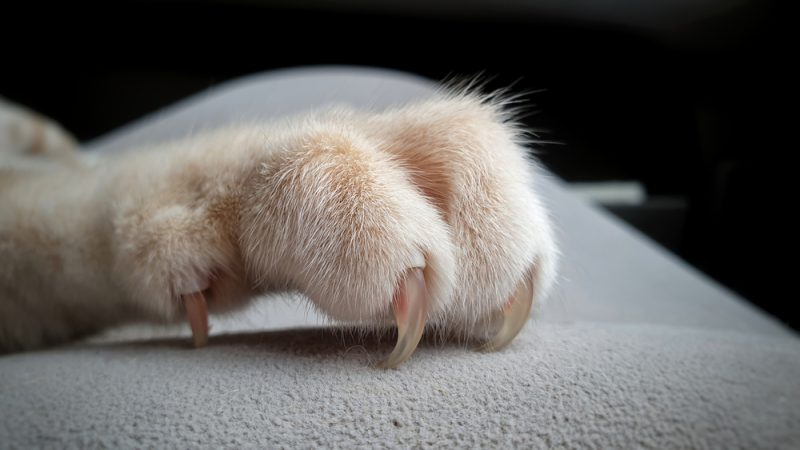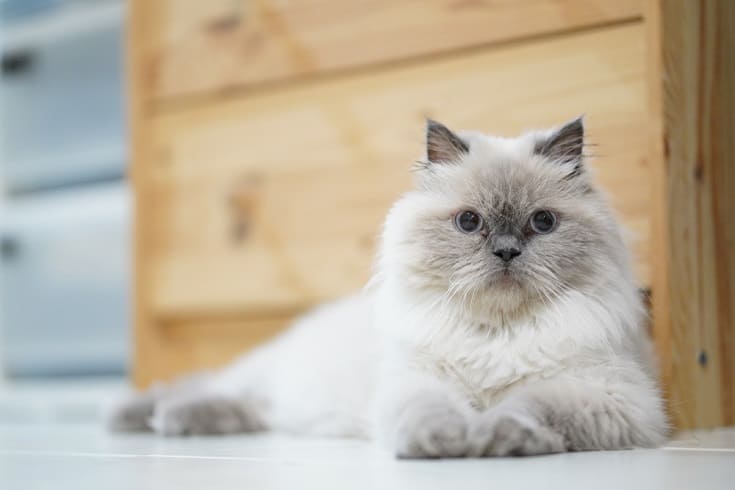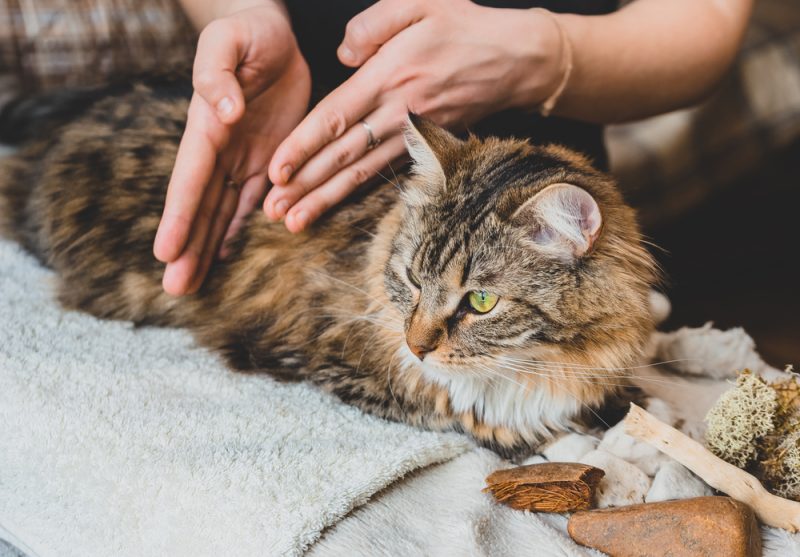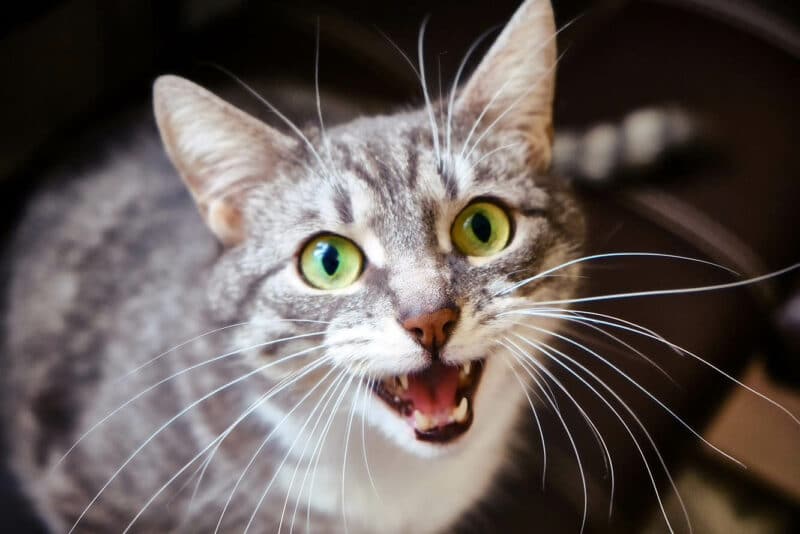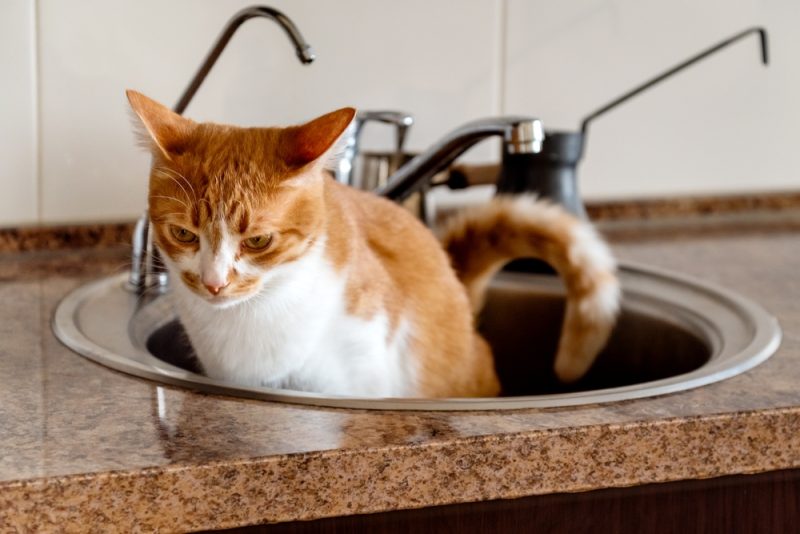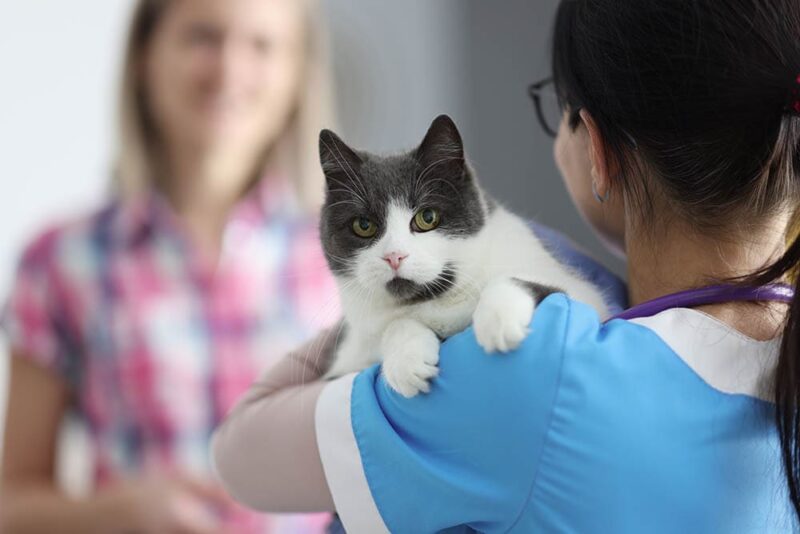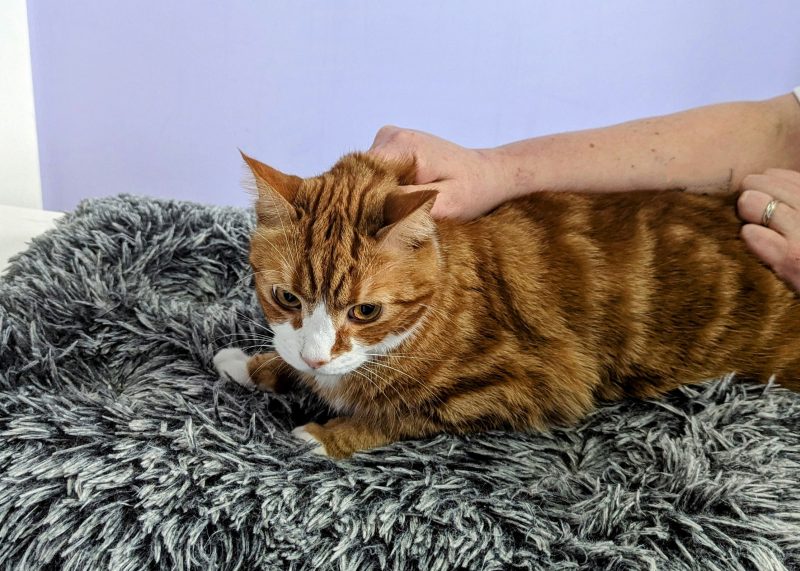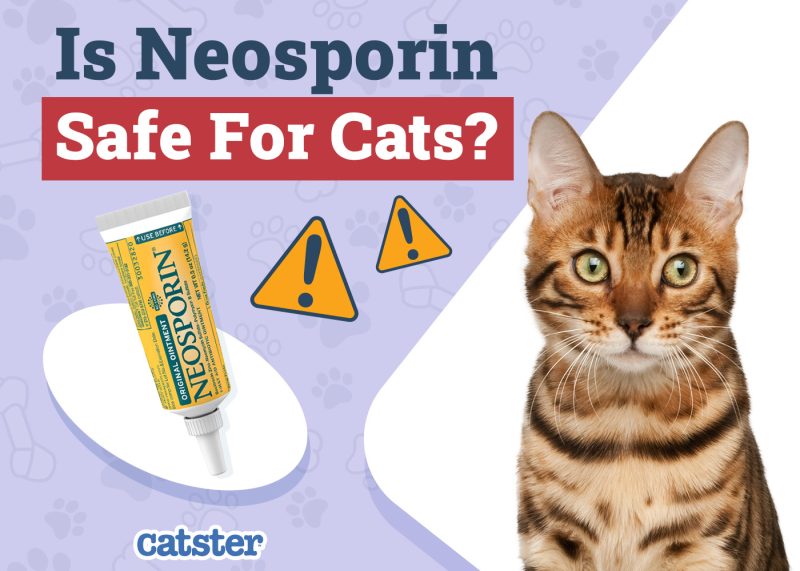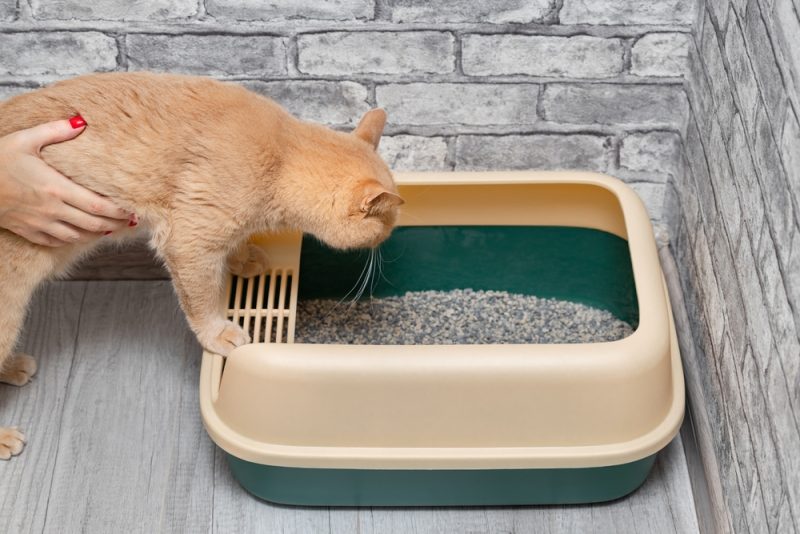In this article
View 2 More +It’s normal for us to lose our voice or feel hoarse when we’re sick or after yelling at a party or concert. It’s not as common of an occurrence in our pets. If your normally vocal cat has suddenly lost their voice or their meows have become raspy, you might be worried about what’s causing the unusual silence.
We always recommend consulting with a veterinarian if your cat starts displaying out-of-character behaviors. Several factors could be contributing to their quietness, and a sudden loss of voice is very likely to be indicative of an underlying health condition. There might be a benign cause behind the silence, but in some situations, this sign could be an indicator of something more serious.
Keep reading to find the potential reasons why your kitty has been silent lately.

The 5 Reasons Why Your Cat Lost Their Voice
1. Laryngeal Problems
Your cat’s larynx (voice box) is what they use to vocalize. If your pet has an underlying issue that affects their larynx, their ability to meow will be affected. If the vet has determined your cat is dealing with inflammation in their larynx, they will be diagnosed with laryngitis. Feline laryngitis is most often caused by infectious diseases like calicivirus or rhinotracheitis.
Calicivirus is one of the most common infectious agents in cats that have a respiratory infection. Cats with this virus will have symptoms such as sneezing, nasal congestion, and nasal and eye discharge. They are also prone to developing ulcers in their mouths and nose.
Feline Viral Rhinotracheitis is sometimes known as feline herpesvirus infection type 1 (FVR or FHV-1). It is an infectious disease and is a major cause of upper respiratory disease in cats. It’s also one of the most common causes of feline conjunctivitis (the most common feline eye disorder). Cats with FVR will exhibit signs such as fever, sneezing, nasal discharge, excessive salivation, lethargy, and anorexia.
Laryngeal paralysis is a disorder of the upper airway. It is rare in cats but could be a reason your kitty cannot use their voice. This condition happens when the cartilage in the larynx is not able to open and close as it should when your cat is breathing.
If you are concerned about the health and well-being of your pet, seek veterinary advice for the best course of action.
If you need to speak with a vet but can't get to one, head over to PangoVet. It's an online service where you can talk to a vet online and get the advice you need for your pet — all at an affordable price!

2. Overuse
Just as humans can lose their voice after talking too much or speaking at a loud volume for too long, cats can lose the ability to meow if they’ve been especially vocal lately.
You’ll see this most often in female cats who are in heat, though it has been seen in both genders. Sometimes cats will meow excessively when they’re put into uncomfortable or new scenarios. Maybe you recently took a long road trip with your cat or had put them up in a boarding facility while you were away on vacation. Your cat will vocalize a lot when they’re stressed so these types of new situations can trigger them into overusing their voices.

3. Environmental Factors
Inhaled irritants like smoke, dust, or fumes from chemicals can cause voice changes in pets.
Inhaled irritants can happen when an airborne chemical or gas is breathed in. A home fire is the most common cause of smoke inhalation in cats as they’ll often retreat to a hiding spot instead of trying to escape. Fires can also release chemical gases that can cause poisoning in your pets. Smoke inhalation can cause serious conditions like secondary pneumonia and even death.
Your cat might also be suffering from feline allergies. Seasonal allergens, like pollen, and indoor allergens, like dust, dust mites, or mold, can irritate your kitty’s throat, which can lead to hoarseness and voice loss.
4. Foreign Bodies
Cats are curious little creatures. It’s not unusual for them to get themselves into predicaments where they’re putting themselves in harm’s way. Small bones, grass awns, or household objects like screws or buttons can become lodged in your cat’s throat if they try to eat or play with them. When foreign bodies like this are stuck in their throats, it will be difficult for them to vocalize. Most of the time, you will notice your cat displaying other signs of this problem, such as coughing, drooling, problems breathing, and anorexia.
A throat obstruction is a potentially fatal problem that must be seen by a vet immediately.
5. Growths or Tumors
Both benign (non-cancerous) and malignant (cancerous) tumors and growths can interfere with your cat’s ability to vocalize.
Lymphoma is the most common type of laryngeal tumor in cats. Other types that have been reported are squamous cell carcinoma and adenocarcinoma. They tend to be in older cats, and unfortunately, most tumors are malignant. If a tumor is to blame for your cat’s change in voice, the vet will need to perform diagnostic tests and create a treatment plan that may involve surgery, medication, or both.
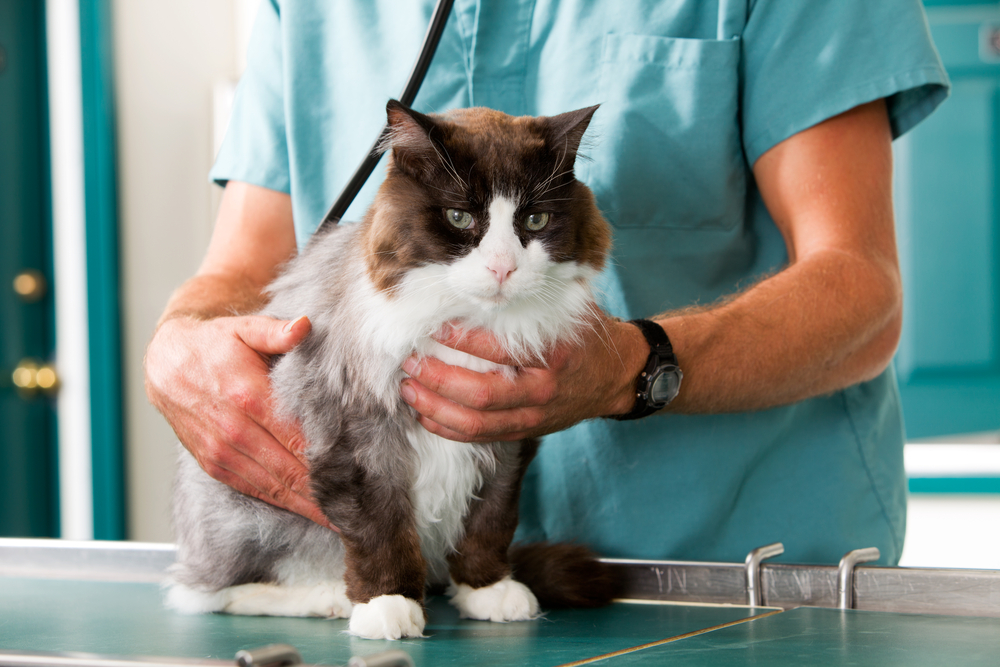

How Can I Soothe My Cat’s Throat?
You should make an appointment to visit your cat’s vet anytime they’re showing signs of illness or discomfort. A vet can investigate the reason behind it and an appropriate medication once they determine what’s your kitty’s problem. For example, the vet may prescribe pain medication if your cat is in a lot of pain, which can help soothe their throat and allow them to swallow. If the vet finds your cat is fighting an infection or inflammation, they may prescribe antibiotics and/or antiinflammatories to help control it.
If your cat has a respiratory infection that’s affecting their voice box, they may also be resisting at food time. Cats use their nose to smell their food before eating it. That’s why they’ll turn their nose up at spoiled food or a dish that’s been tampered with (hence why trying to stick your cat’s medication in their food most likely doesn’t work). While this is a fantastic survival skill, it’s not helpful if your cat is sick and cannot smell their food. They cannot feel better if they’re not able to eat.
If the vet has diagnosed a respiratory infection, try offering them slightly warm (but not hot) food. Warmer foods tend to produce more of an odor and will be more tempting to a sick cat. Mix a bit of warm water with their soft food to create a creamier and softer version that’ll feel nice on their throats.
If your cat’s hoarseness is due to growths or tumors, the vet will talk to you about the best treatment option for your kitty. Options might be surgery, medication, or a combination of both. The same goes for cats suffering from laryngeal paralysis.
If your cat is diagnosed with an allergy, the vet will create a management plan to minimize your cat’s allergy signs.
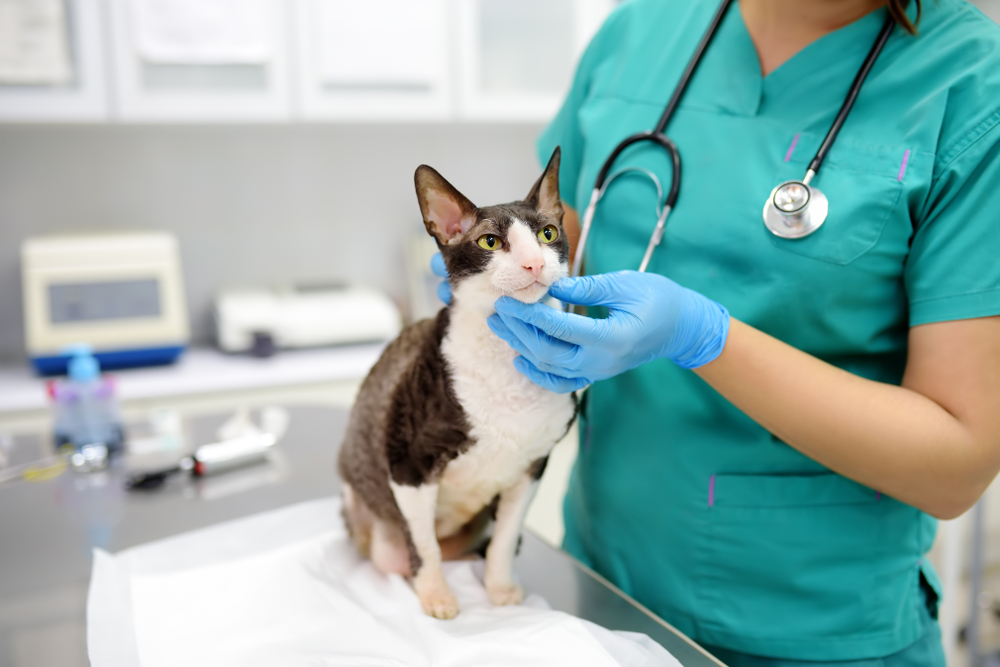
Is Laryngitis Contagious?
It depends on what’s causing the laryngitis diagnosis.
Cats with upper respiratory infections are contagious to their feline housemates but not to humans. If you have a multi-cat household, we recommend separating the kitty with laryngitis from their housemates until they have been cleared by the vet. The viruses responsible for infectious laryngitis are very contagious, and a single sneeze can expose the other cats in your home to the laryngitis-causing virus. This is even true if everyone is up to date with their vaccinations; however, the signs will be milder, so vaccines are still highly recommended.
If you have multiple cats in your home, wash your hands thoroughly after handling your sick pet and make sure they are using separate food and water bowls.
There are several things you can do to keep your isolating cat as comfortable as possible as they recover. Provide them with a quiet and warm spot to rest. Give them plenty of water and wet food (as directed above). A humidifier can be helpful if your cat is congested. Don’t stop giving your cat medication that’s been prescribed until a vet recommends you to do so, even if they seem to have recovered.

Final Thoughts
While there are a lot of factors that could be contributing to your cat’s sudden silence, they’re not all an immediate cause for concern. We do always recommend making a visit with a vet though, since a change in your cat’s meow is most likely an indication of laryngeal diseases that warrant treatment. We like to err on the side of caution when it comes to our feline family members and bet you do too.
See also:
- Is Cat Laryngitis Contagious? Health Facts & Care Guide (Vet Answer)
- Can Cats Get Laryngitis? Vet-Verified Health Facts
Featured Image Credit: Oscar Wiedemeijer, Shutterstock



